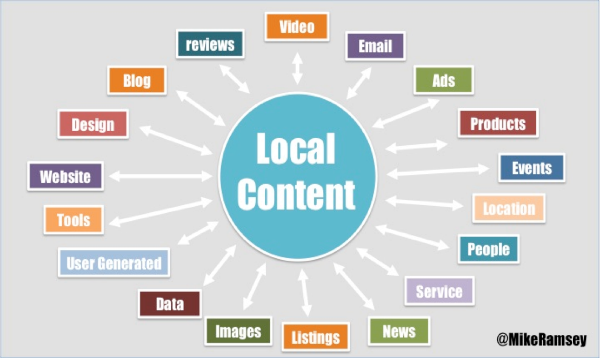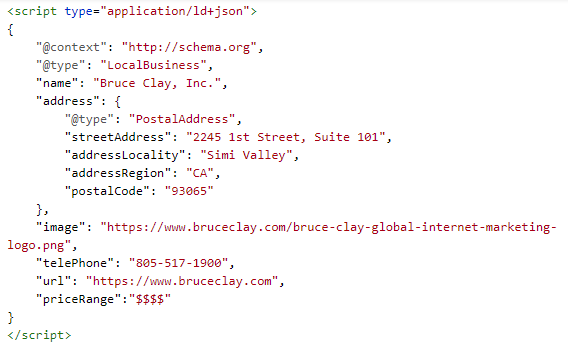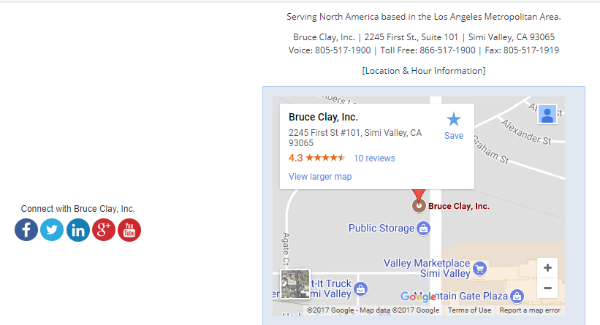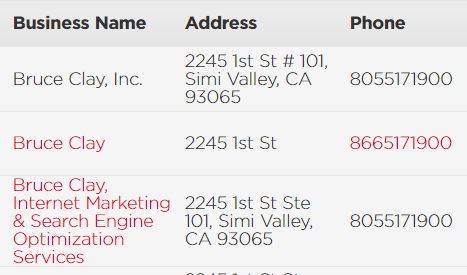How Do I Rank Higher in Google Local Search? Bruce Clay’s Checklist for Local SEO
The good news: Showing up in Google’s search engine can be extremely beneficial to your local business.
The bad news: Google doesn’t care if you rank high or low. It cares only that there are quality results that answer the query to the total satisfaction of the searcher.
So the pressing question is, how do you rank higher on Google Maps and Google local search results? This list of local SEO ranking factors is not exhaustive nor in priority order, but grouped into general categories which you can jump to as follows:
- Housekeeping signals
- Keywords and content signals
- On-page signals
- Linking signals
- Local Pack signals
- Social signals
- Success signals
Housekeeping Signals
1. Branding
Being a respected business in your community will increase your local search visibility. Google pays a lot of attention to a brand’s perceived trust and expertise. Even if you’re just starting out, aim for happy customers and consistent quality to attract traffic and mentions.
2. Domain name
Your website’s name should accurately represent your business or brand. It’ll be in every URL, so make it something appropriate and easily remembered. Don’t use a keyword phrase alone (e.g., www.FloristLosAngeles.com) to avoid an exact match domain (EMD) penalty. On the other hand, including a keyword as part of your domain (e.g., www.FirstStreetDental.com) can help you as a local business if it’s tied into your brand name. Search algorithms are getting better and better at weeding out low-quality results, so make sure your domain doesn’t look like spam.
3. Hosting
When it comes to web hosting, think about speed, availability, and maintained software. Choose a host that ensures your content is served up quickly, since page load speed is now a factor in Google’s algorithm. Beyond the hosting platform, there are many ways to speed up your web pages. Using Accelerated Mobile Pages and/or Progressive Web Apps may be worth considering, as well.
4. Content management system (CMS)
Above all else, your CMS should be easy to use. Here, WordPress is king, consistently the top CMS used on the web. Consider how you can improve your system’s functionality with plugins — WordPress.org lists 1,864 plugins for “local” alone. And, don’t forget about a WordPress SEO plugin, too.
5. Compatibility
We’re in a mobile-first world, with the majority of searches happening on smartphones and Google evaluating sites based on their mobile friendliness. Check your site to make sure it’s mobile friendly and optimized for mobile devices — otherwise, your rankings and visitor counts will suffer. Voice search is the next big area of compatibility.
6. Email
Use your business’s domain in your email address (@bruceclay.com) rather than @gmail or another generic provider. It’s a small point, but worth putting on the housekeeping checklist to increase your professionalism and perceived trustworthiness.
Keywords and Content Signals
7. Keyword and content gap analysis
Identify the keywords working for you in terms of hitting key performance indicators and bringing in revenue. Use keyword research to find additional phrases that can serve your personas/community, and examine your competition online for their keywords. Wherever you find a gap in your own content compared to the top-ranking sites, expand accordingly.
8. Detailed competitive review
To get a more in-depth look at your competition, you’ll need to perform some competitor research and siloing your web content based on the themes your business is about. Set up your navigation and internal links carefully to create a hierarchical structure for the content on your site. Doing so will strengthen your site’s relevance and expertise around those topics.
10. Content variety
Many different types of content can be “localized” to pertain specifically to your community. The list includes images, news, events, blog posts, videos, ads, tools and more. Having a variety of types of content indexed also gives your site more opportunity to rank, since they can appear in the vertical search engines (e.g., Google Images, YouTube, etc.).

11. Content creation strategies
To establish yourself as a local authority, tell local stories and express your opinion about the topics your business and your customers are focused on. Excellent content can become a strategy for attracting search traffic and also local expert links.
12. Local videos
When you create videos that are appropriate to your website and region, you’ll soon discover that people will share them more on a local level. Build landing pages for your videos on your site to attract links and mentions. You can do this by uploading a video to your YouTube channel first, then embedding it on your page (copy the HTML right from YouTube’s Share tab into your page’s code).
13. Long-tail rankings
Use locally relevant content to rank higher in searches around the Local Pack. Examples would include posts like “The 5 Best Restaurants in Las Vegas,” which could answer long-tail queries such as, “What are the best restaurants in Las Vegas.”
14. Local relevance
Having content that’s locally focused can improve your reputation and reach in your area. This requires more than doing a find-and-replace on the city name to create hundreds of basically duplicate pages. You can start with templates, but make sure you’re including enough customized text, images and data to be locally relevant.
15. Landing pages
For the best local results, create optimal landing pages. For example, if your brand serves a wide region, you might have a different landing page for each city in that region, like “dog grooming Simi Valley” and “dog grooming Thousand Oaks.”
16. Schema NAP+W
Schema markup is code you can add to your website to help search engines understand your various types of information. According to Searchmetrics, pages with schema markup rank an average of four positions higher in search results.
Local businesses need schema in particular to call out their name, address, phone and website URL, also known as NAP+W, as well as hours of operation and much more. As an example, here’s what schema for our NAP+W would look like in the page code:

Google is planning to expand its use of schema, so be sure to take advantage of all the structured data that applies to your content. Check out Google’s Structured Data Testing Tool to confirm you’re implementing schema correctly.
17. Information in the Local Pack
Search engines want to make sure local business information is valid before presenting it in the “Local Pack” (the handful of local listings Google displays at the top of a web search results page, with addresses and a map). A business’s proximity to the searcher heavily influences whether it shows up in Local Pack results, so your location matters.
Keep your NAP+W data consistent across all sources. This is a local SEO priority, as it improves the search engines’ confidence in your business listing’s accuracy.
Be sure to include your business address on your own website. You can do this in the footer so it appears on every page, or at least show it on your contact page.
18. Google Map embedded
By adding a Google map to your contact page or footer, you can quickly show searchers and search engines exactly where you’re located. Using an embedded map rather than a static map image provides extra functionality and reduces friction — a human visitor can just click the map and grab directions. On our site, the embedded map shows in the footer when a user clicks [Location & Hour Information]:

19. Testimonials
To boost your brand’s credibility, you’ll need to get some local reviews or testimonials. Earn them (here’s a list of SEO-approved ways to get local reviews) and then add them, localized and with the author identified whenever possible. Testimonials, especially on a local level, can have a big impact. Seventy-three percent of consumers say that positive reviews make them trust a local business more.
20. Hawk update
Google has long had proximity filters in place that prevent multiple listings from the same business monopolizing local search results. However, in the August 2017 Hawk update Google tightened its proximity filtering for organic ranking. The filtering radius for a same category business has been reduced from 500 feet to 200 feet. Same category businesses at the same address, however, are still filtered. The more exact restrictions may benefit businesses that previously had a higher ranked competitor just down the street, as both businesses may now be able to show up in local results. (Edited, h/t Mike Blumenthal)
On-Page Signals
21. Technical on-page SEO
On-page elements are critical to get right for organic SEO on any web page. In addition to the standard optimization items (see our Always-Up-to-Date SEO checklist for a list), a locally targeted page should have:
- City in the title tag
- Schema markup (as appropriate to the page contents)
- Do not stuff keywords
- Do not simply find-and-replace city names
- Appropriate reading level and complexity (compare top-ranking pages to find your sweet spot)
22. Local keyword optimization
Be sure to mention local keywords on your web pages (such as the name of your city, state or region and other geographical/local references) to help solidify Google’s understanding of your location and help you rank for local keyword queries.
Linking Signals
23. Local link building
You cannot rank in a city without having local links. When relevant, quality websites within your city link back to you, it shows you’re a trusted local brand. Only links coming from unique IPs, unique domains and unique WhoIs for your geographic area will help you rank, so don’t fall for link schemes. The anchor text (clickable text) used in the links also send a signal to search engines. (See more link building guidelines.)
24. Local directories
To make it easier for searchers to find you, you’ll want to be included in geotargeted directories for services, such as Yellow Pages online, a local restaurant database, or other. These citations add more weight to your site in the local search ranking algorithms. (This interview with local expert Darren Shaw gives helpful information on local listings, including a directory list.)
25. Social and web mentions
Are people talking about your brand online? Even if they don’t include a link, brand mentions on social media platforms show engagement and interest in your business. These linkless mentions (and also “nofollow” links) help your business by attracting new customers and reinforcing your brand’s reputation, which can even influence local search rankings. Use a tool like GeoRanker to identify local citations and social media tools to keep tabs on the conversation.
26. External links
Boost your credibility by linking to local expert resources that would be useful to your site visitors. Choose external web pages that are relevant to your subject matter and region. Remember that in order to be viewed as a local expert, you should visibly network with other local experts.
27. Competitor backlinks
If someone is linking to your competition, they might link to you as well. Start by looking at the backlink profile of your top-ranked competitors (using a backlink analysis tool such as Majestic, Ahrefs or other). Identify good candidates — high-quality and relevant sites that don’t already link to yours. Then see if you can earn links from those same sites.
Local Pack Signals
28. NAP+W consistency
As mentioned earlier, NAP+W refers to your business name, address, phone number and website URL. The goal here is for your NAP+W to be consistent across the board — wherever it’s listed online. For local optimization, you don’t want to have various versions of your address and phone number out there, such as:

To see if your NAP+W is consistent, try Yext’s free test.
29. Google My Business (GMB) optimization
Having a Google My Business listing is critical for businesses with service areas and physical businesses. It’s a free business listing to start building your visibility in Google Maps and Google Search.
In addition to ensuring NAP+W information is accurate, here are some optimization tips for your Google listing:
- Add a unique description about your business. Make it long (400+ words), formatted correctly, and include links to your website.
- Add your open business hours.
- Select the best categories for your business (use Blumenthal’s Google Places for Business Category Tool).
- Include a high-resolution profile cover image, plus as many additional photos as possible.
- Use a local phone number (not a toll-free number).
- Encourage reviews from your customers.
- Use Google Posts to enhance your brand’s Knowledge Panel with upcoming events or special news. Your post displays only temporarily (usually for seven days), but will remain visible to anyone looking up your brand using Google mobile search, so make each post unique.
Secondly, create and optimize your business listing on Bing Places for Business.
30. Check your site on Google Maps
Your Google My Business listing and schema also help get your business to show up in Google Maps. Since navigation systems and customers may refer to Google Maps to find you, make sure the pin marks the correct location for your business. Here’s how to add or edit your site in Google Maps.
31. Local business listings
Increase your visibility by including your business on sites such as Yelp, Thomson Local, Angie’s List, Yellow Pages, TripAdvisor, Urbanspoon, OpenTable, Merchant Circle and Foursquare, as well as local travel and news sites — choose the sites that fit your type of business and customer base.
32. Better Business Bureau (BBB)
Boost your credibility by ensuring that your business is listed with the BBB. Monitor your ratings there and display your BBB rating on your website as a trust signal for visitors. As with all local directories, make sure your location information on BBB matches your NAP+W.
33. Citation building and reviews
Reviews will usually reflect absolute happiness or absolute misery. So it’s important to monitor the quantity and sentiment of your online reviews so you can actively manage your reputation.
- Review sites to monitor include: Facebook, Google, Yelp, Bing, local chamber websites and more.
- Sites where citations and mentions may occur include: Reddit, Quora, news media sites like WSJ, etc.
- Consider adding a page to your website with instructions on how to provide reviews and feedback.
34. Location pages
It’s recommended that you have one or more pages on your site dedicated to each location your business is in. Dedicate a page to each keyword, for example, “real estate agent, Simi Valley” (services, then city). Design this to be a good landing page for anyone searching within that area, and make the content unique. Avoid laundry lists or simply doing a wild card replace for the city name. Search engines can spot that type of duplicate content a mile away. (See our tips for dealing with thin content on your site.)
35. Press releases
Press releases can be a great way to let locals know that you exist, especially if you have breaking news. Opening a new location? Hosting a charity event? Be sure to publicize it, and include the local geo references (city name, etc.) in your text. A press release published through an online PR site might catch the eye of a reporter who will publish a news article about your business in a local publication.
Social Signals
36. Social profiles
Being active in social media and sharing your content (think content marketing) contribute to keeping your business top-of-mind. On social media sites like Facebook, Twitter, Instagram, YouTube, Google+ and Pinterest, your profile pages matter — make them consistent with your brand voice and informative. Be sure to include your contact information. Engagement with your brand is a social signal, such as when something you’ve posted is shared or liked. It’s also a way to engage with current and potential customers.
37. Touch your followers
Help customers stay in the know. Social media can be an efficient way to spread news, local deals, alerts and updates to your customer base as well as get the word out to others. Interact with them one-on-one, and you may develop a brand advocate for life.
38. Become the local expert
Make yourself known as a trustworthy business by building local expertise and authority in your space. For example, you could teach a class or speak at a local event. Brainstorm presentations that bring value to an audience while showcasing your expert knowledge related to your business.
39. Local discounts
Attract local customers by offering discounts for locals. For example, you could offer members of a local organization $x or x% off your products or services, accept AAA discounts, or other.
Success Signals for Local SEO
40. Online and offline conversion tracking/analytics
Stay on top of your conversions — actual results and dollars earned from your website — through analytics. (If you haven’t yet, set up Google Analytics for free.) Pay particular attention to rising or falling click-through rates and bounce rates, which will show you how many searchers clicked through to your site and whether they liked what they found.
Enable mobile users to simply click to call your phone number wherever it appears, and track those interactions. Appointments and sales made online may also be important metrics for success. Remember, not counting progress is a failure.
41. Monitor rankings
Be aware of your rankings in regular organic results and in the Local Pack. I suggest you choose at least five specific local keyword phrases to focus on at a time, but test more for rankings. Regularly check to see whether your business shows up on the first page of search results; compare your results to that of your competition. You can do this through manual viewing of “[keyword] near me”-type searches, if you’re in the local area. You can also use a tool like AuthorityLabs to track local rankings.
While there’s a lot of work that goes into boosting your local search rankings, it will be well worth your time and effort as a local business. It may even mean your survival. The points on this local SEO checklist give you lots of ways to attract more customers with your online strategy.
I want to hear from you. Would you add anything to this list? Share your local checklist to-dos in the comments below. Then share this article with a friend.

112 Replies to “How Do I Rank Higher in Google Local Search? Bruce Clay’s Checklist for Local SEO”
All beginners should read this blog, so much helpful information is given. Thank you for sharing
We value your sharing your expertise with us. By chance, I stumbled across this page and its wonderful and useful stuff. I’ll definitely continue to read your blog. Keep sharing the word.
Thank you for sharing this excellent article. I thought your article was perfect for what I needed.
Good information about local SEO search ranking factors, article was quite helpful. Thank you.
With proper optimizing of local business details, you can go above your competitors in Google SERP.
Thanks a lot Bruce! for sharing great article also learn good tips. its really helpful for me!
This is a fantastic resource for implementing local SEO and analyzing existing websites.
I have been looking for this information for quite some time. Will look around your website.
One of the best Local SEO article and website I have ever came across. Thanks for sharing the long list with us.
Thanks, Bruce for your important article. I said Important bcoz, I’m searching for the best SEO-ranked agency for my website.
Hi Media Heights,
If you’d like some help with SEO, we’d be happy to discuss how we can be of assistance. Please send us a message with details using our contact form. https://www.bruceclay.com/quoteform/
Thanks,
The awareness of local business optimization is constantly rising and your exhaustive article is a timely share for all the local business owners as well as many marketing experts with a crystal-clear optimization plan for surefire success.A majority of customers that are ready to buy or use local services are typing in buyer intent keywords which is why long-tails are so important. The rest of the checklist will pretty pretty much get you ranking anywhere.
very nice article, i am making effort to rank on maps, this will definitely help my cause
These are very actionable tips for Local SEO. I’m trying my best to get more customers and traffic through GMB for my consulting service. I think that testimonials and customer reviews play a huge role in local SEO. Usually, listings with more reviews appear on top.
Google local SEOsearch is a great way to grow your business and there are many SEO tools assist you in getting good search rankings available at: smileitsolutions.com/freeseotools/
Thanks for sharing the informative post on how to improve the SEO and rank higher on Google.
Nice Blog. Make use of GMB (Google my Business) Listing or Schema Markup to achieve better results in Local searches & Business.
Thanks
Excellent information with unique content and it is very useful to know local seo.
Thank you for sharing your great knowledge with us.
Looking forward to your further tips on similar topics Thanks for sharing these wonderful tips
This article is good for new optimizer and who want increase his or her website in google ramk. I seem organic SEO is the best tricky than other.
This is really a very helpful post on how to improve seo and rank higher on google. Thanks a lot!
Every point you have discussed is quite important to rank better thanks for local seo guide.
Local SEO is one of the best ways of getting leads for your business near your location.
Well, SEO services are on the up as many business rely on online business during the covid-19 (Chinese Virus) Pandemic. So thank you for the info! Be safe!
Local SEO is the best way to stay at the top of Google’s local search results. However, spammers have flooded the industry and ruining the market for the blue-collar, tried and true, white hat agencies. Thank you so much for such an informative post on this topic.
Great Content! In my Knowledge Google My Business and Markup Schema is on top among these all.
Thanks
Great list for Local SEO campaign success! Well, i personally consider Schema Markup to be one of the major Local SEO ranking factors. But still the post was really nice! thanks for sharing..
Local SEO is one of the best ways to stay atop of google search results. However, the industry has been flooded with spammers ruining the market for the blue-collar, tried and true, white hat agencies out there. Thank you for the information on this topic.
Awesome work Bruce. I really liked this post. This all factors are essential for the local search engine ranking.
Thanks for sharing for this article.For business’s local ranking by using Google My Business improve your SEO and gain more local search visibility!
A brilliant information for youngsters to Start Seo campaign for their site. thanks for sharing
Local SEO is extremely important for every local business that wants to stay in business.
Thanks for the schema markup for NAP-W very helpful!
What a list mike! One of the better SEO articles I’ve read in a long time, just because you break everything down easily to understand. Keep it up!
The article is very lucid in terms of language. It describes the role of different search ranking factors to gather more traffic specially at local level. Waiting for next post.
Thanks for the refresher Bruce, and especially the schema markup for NAP-W.
Local SEO is a field of its own!
Hello, Bruce Clay
You have done a great work, awesome local SEO guide for all of us. Thanks for this guidance.
Bruce,
This is a wonderful checklist to get started.. We will be utilizing this as we have taken over our digital marketing.
Great detail here, thanks for the information, always good to review all aspects of our local marketing strategy.
Hi Bruce,
Thanks for this list. i am just getting started and I will definitely be following this closely!
What an insane post :)) Bookmarked!
Thank you so much for the insights. We barely use 25% of the techniques you mentioned. Gotta talk with my manager to start impementing as many of the above. Thanks again
Bruce,
This is a very comprehensive local SEO checklist. Thank you for sharing this with the SEO community!
Hi Bruce,
Excellent post. Includes entire essential ranking factors. Thanks a lot for sharing this.
That is amazing Information. I think it is a basic guide for SEO. It is really useful and knowledgeable. Thanks foir share.
I am the big fan of Bruce clay sir, I want to be like him, Thanks for sharing useful information
This post is relay helpful for those who are spamming his/her business by posting fake review on GMB(Google My business Page). A great post thanks for share…
Thanks, Bruce these is really helpful information for the beginner and small business. You have covered all important point the one who implement this checklist will definitely get good ranking
Awesome blog, definitely this can help a lot to the small and medium companies. Thanks for sharing
That’s really a good information about the Local SEO Optimization.
Once we will implement this strategy we will get the results that were needed!
Generally, ranking for local SEO is fairly easy for most small businesses. You’ve pretty much hit all the major points on the head.
It’s nice to see a good quality guide that I can use in SEO training with our new recruits
These tips can be very helpful for a local business, who want to grow their customer base and to get higher rankings in google.
Your Post is too much informative and it contains everything regarding SEO, Thank you so much it will help beginners.
This is a fantastic resource for implementing local SEO and analyzing existing websites. Thank you for sharing with us. I was unaware of the proximity change in the Hawk update.
Thanks Bruce for sharing Local SEO factors because sometimes we focus globally but forget to target local audience. So all above-mentioned tasks are useful for local ranking.
Well written article. I really want to appreciate the time and effort you put in to write this post. Thanks for sharing such an awesome local SEO checklist with us. Keep up the good work.
Google pays a lot of attention to a brand’s perceived trust and expertise. Even if you’re just starting out, aim for happy customers and consistent quality to attract traffic and mentions.
You can try to game the search results all you want, but if your business is consistently getting bad reviews, you have other issues to worry about. Focus on fixing any core problems in your business so that your clients want to talk about you. SEO experts can’t help you much if there are underlying issues preventing your business from thriving.
Hi Bruce
The awareness of local business optimization is constantly rising and your exhaustive article is a timely share for all the local business owners as well as many marketing experts to start 2018 with a crystal-clear optimization plan for surefire success.
Thanks
Thank you for sharing great article also learn a lot from these tips.its really informative and helpful.
Wow! Brilliant content about local seo search ranking factors. This blog covered all the major factors to rank well. Thanks for the useful information.
Solid list Bruce! I’m definitely a fan of using long-tail keywords for local SEO. A majority of customers that are ready to buy or use local services are typing in buyer intent keywords which is why long-tails are so important. The rest of the checklist will pretty pretty much get you ranking anywhere.
Thanks for sharing its a very useful article. I have same question like consulenza. Is there any technique to pin a business on our city map? I already contract in google support for pin but stile I have to search. Any tip about that?
Thanks Bruce for your important article. I said Important bcoz, I’m searching for the best seo ranked agency for my website.
Thanks for sharing this content. What a list! I would have a question about item #30: is there any technique to pin our business on our city map? I mean… some business do not appear when we zoom in the map, you really have to search that business name to find it. Any tip about that?
Consulenza: Have you checked Google support for help placing your pin in Google Maps? You can start here: https://support.google.com/business/answer/6279343?hl=en
I began deal with my administration and item site and focusing on neighborhoods, this article is the best guide for me. I will endeavor to take a shot at every single term which you specified here. Awesome thank you and continue composing.
Hi,
Under Google my business (29) you state: “Add a unique description about your business. Make it long (400+ words), formatted correctly, and include links to your website.”
I’ve been running a GMB listing for over a year now, but a description area i’ve never found. Could you explain me where i’d find it?
thanks,
Wouter
Wouter: You can add a description of your business in your Google+ business listing, not in Google My Business now. Barry Schwartz wrote out the procedure when it changed in August 2016 (https://www.seroundtable.com/edit-introduction-field-in-google-22484.html). Go to aboutme.google.com, click in the top right and choose the desired Google profile. In the Story section, click the pencil icon to edit your business description. I hope this helps!
Your statement above about filtering is not correct. From the SEL article about filtering which is still in place just not as broad:
On August 22, 2017, Google refined the proximity filter to make it stricter. It still appears to be filtering out businesses in the same building, but it is not filtering out as many businesses that are close by.
It still filter same category businesses at the same address and will do so for about a 200 radius. Previous to Hawk the filtering radius was about 500 feet.
I started work on my service and product website and targeting local areas only, this article is the best guide for me. I will try to work on each and every term which you mentioned here.
Great thank you and keep writing.
Local seo can be tricky to start off but it really pays off in the long run, assuming you’re doing everything correctly & testing the market.
LEAVE A REPLY









